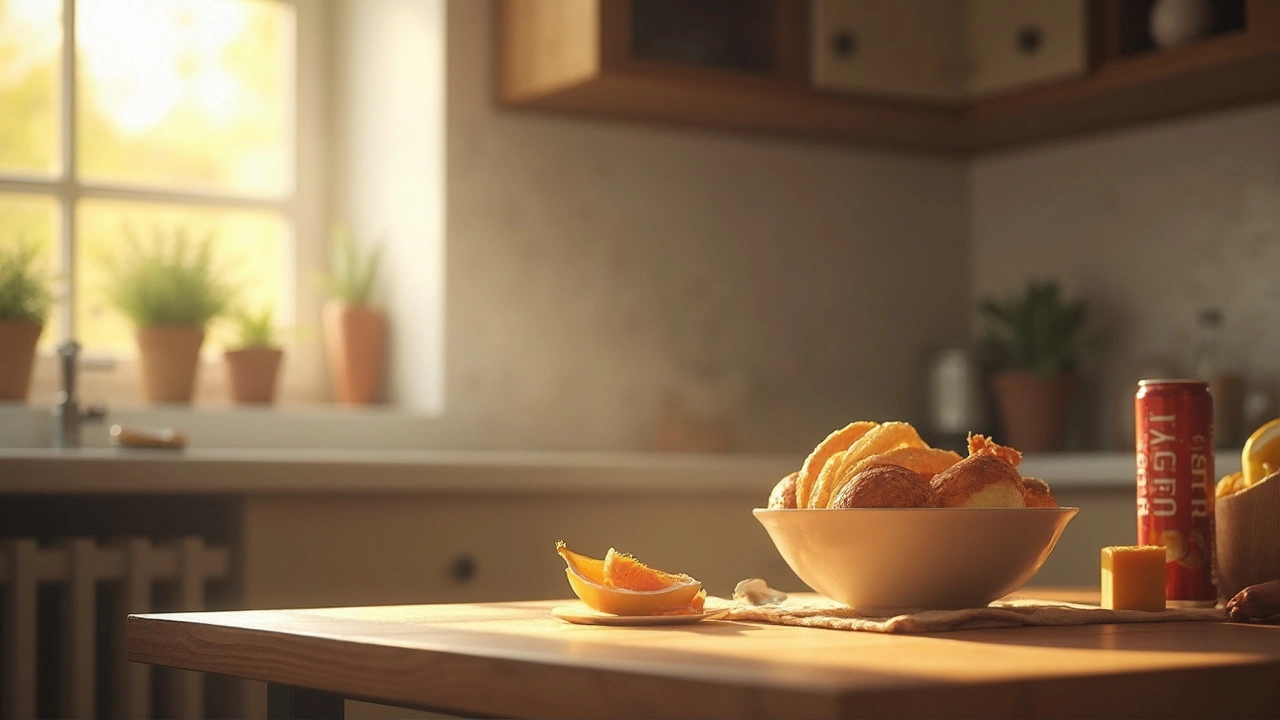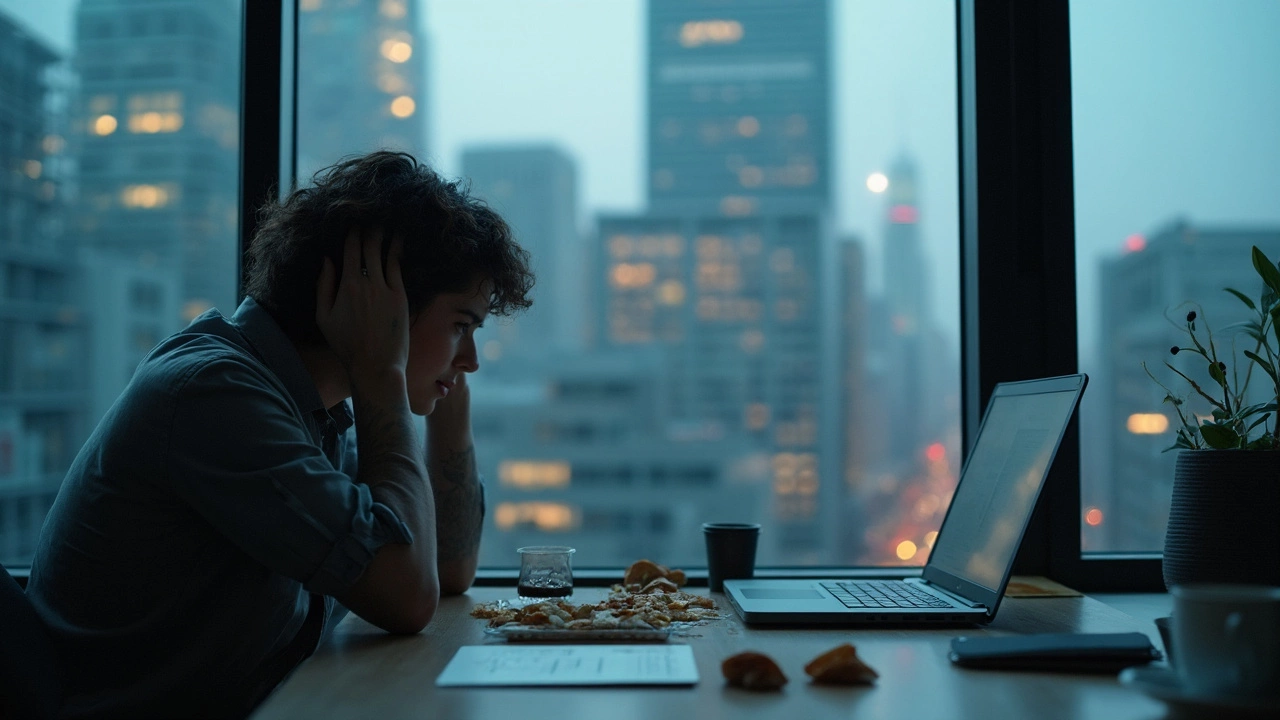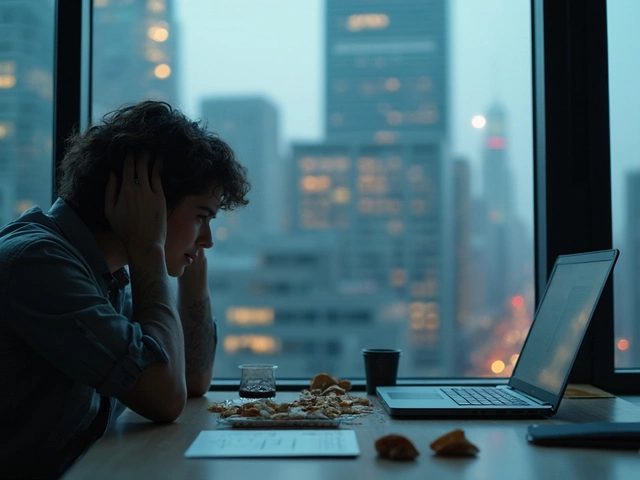What Wrecks Stamina: Everyday Habits That Drain Your Energy
Ever noticed how some people just never seem to get tired? You’re puffing up the stairs with burning legs, while the person next to you is barely breaking a sweat. It’s not always genetics or endless gym sessions. Truth is, stamina isn’t only built in the gym—it’s destroyed much more quietly, in ways that barely register until one day you’re struggling through things that once felt easy. That snappy, humming energy you took for granted? Daily life gnaws it away unless you spot the culprits fast.
Why Your Stamina Gets Sapped Faster Than You Think
First up, let’s get honest about the main stamina busters lurking in plain sight. Most folks blame age or bad luck, but usually, it’s a pile-up of habits sneaking under the radar. Poor sleep is a massive offender. Loads of research, like that giant University of Pennsylvania study, makes it clear: even one week of sleeping only six hours a night leaves your energy and focus in the basement. It’s not just how long you sleep—it’s whether you ever get deep, undisturbed sleep. Waking up to check your phone or popping out of bed every night (maybe thanks to late caffeine) messes with your REM cycles, and that’s where real recovery lives.
Nutrition is another stamina-killer. We're talking way beyond just skipping breakfast. Ultra-processed foods—think takeaways, sugary snacks, or fizzy drinks—give you a rush, then crash. Science from King’s College London found people who get most of their calories from these junk foods end up not just heavier, but weaker and more wiped out by the end of the day. These foods spike blood sugar, then cause it to plummet. You feel tired, irritable, and too sluggish to even consider a jog or long walk. Add in a lack of basic nutrients like iron, magnesium, or B vitamins, and you’ve got stamina circling the drain. Visit any GP in Ireland and mention constant tiredness—they’ll ask about iron or vitamin D. That’s not just a checklist, it’s because deficiency in these is public enemy number one for lasting energy.
Hydration deserves its own rant. If you’re not drinking enough, your blood thickens up, heart works harder, your muscles don’t get oxygen as easily, and you feel flat physically—and mentally. Even mild dehydration (as little as 1–2% lost body water) drops your endurance and cranks up fatigue. And if you think coffee and fizzy drinks are a clever swap for water, they’re not. Yes, tea and coffee count towards your total intake, but 3–4 cups and you’re nudging into dehydration territory if you’re not topping up with H2O. That headache in the afternoon? Often dehydration disguised as stress.
Modern stress is stamina’s silent killer. We live on high alert and that keeps your cortisol sky-high. When your body’s always fighting imaginary tigers (deadlines, traffic, doom-scrolling the news), you’re burning through adrenaline and draining your reserves long before you ever step onto a treadmill. If you notice you’re always anxious or tense, don’t be shocked at muscle cramps and that sluggish, 'off' feeling—stress is draining your stamina tank 24/7.
Let’s not forget alcohol and smoking. A pint might help you chill, but it wrecks your deep sleep and zaps muscle recovery. Smoking (including vaping!) tanks oxygen delivery, so your muscles get tired way faster. Even a few puffs daily train your heart to work overtime while you exercise. For regular drinkers and smokers, breaking the cycle is the fastest shortcut back to natural energy.
Surprisingly, even technology habits join the hit list. Constant blue light from screens messes with melatonin, delaying real sleepiness. And if you’re always scrolling late into the night, you’re giving up deep sleep for trivia and memes. Next thing, you’re flat as a pancake by noon the next day, incapable of anything more demanding than pushing remote buttons.

The Day-to-Day Traps Nobody Talks About
Ever found yourself exhausted after a day of doing nothing very physical? There’s a reason for that. Physical inactivity is its own energy-sapper. Your heart, lungs, and muscles run best with regular use. Sitting all day slows your circulation, saps muscle strength, and drains stamina. The Irish Heart Foundation says that simply standing and moving every 30 minutes helps keep your energy humming. That’s all—just getting up, stretching, maybe a few squats or a brisk walk for a cup of tea. It sounds basic, but people who break up sitting report sharper focus and fewer midday energy crashes.
Office life is a stamina trap. Most jobs push us to sit, click, browse, repeat. Open-plan stress, processed food at meetings, and run-on screen time—it's a recipe for wiped-out evenings, no matter how cozy your chair or how good your monitor. Eye strain, stiff muscles, and shallow breathing from slouched posture all add up. Even posture matters: hunched shoulders and a curved back (the classic desk pose) actually restrict lung capacity. If you’re struggling uphill on your commute home, thank your chair as much as your genes.
Social burnout is real too. Ireland’s got a legendary pub culture, but too many late nights, noisy rooms, and long conversations can leave you drained, not energized. Ever noticed that 'hangover' after a wild Friday, even if you skipped the drink? That’s your nervous system begging for a break. Social fatigue is a thing—introvert or extrovert, your body needs downtime to recharge actual stamina.
The weather plays a sneaky role as well. Here in Dublin, endless grey skies wind up making you sluggish and down. Low vitamin D from a sun-starved winter adds to the effect, making your muscles feel heavy and your general energy nosedive. People in darker climates complain about tiredness more than their sunny-weather friends for a reason. Getting outside, even on cloudy days, helps—but sometimes a high-quality vitamin D supplement is the only fix.
Look at your phone habits, too. Constant notifications break focus and keep your brain in 'alert' mode, zapping your attention span and leaving you feeling tired before you hit the halfway point of the day. That end-of-the-night doomscrolling? You’re sacrificing tomorrow’s stamina every time for tonight’s boredom. It’s a swap that never pays off.
- Stuck on a screen late? Try blue light blockers or switch devices to night mode two hours before bed.
- Craving sugar every afternoon? That’s your body yelling for real food. Swap sweets for protein or healthy fats to dodge a sugar crash.
- Hate water? Add a slice of lemon or go fizzy with sugar-free options to trick your tastebuds.
- Feel like you can't say no socially? Decide in advance how late you’ll stay and stick to your limit.
- Notice you’re tired every Sunday? Plan your errands and active time for earlier in the week so you’re not running on empty come Monday.

Fixes That Actually Work—And They’re Easier Than You Think
You don’t need to train for a marathon or buy fancy gear to rebuild good stamina. One of the most powerful hacks? Prioritise recovery over perfection. If you know you’re running low, skip the all-nighter or the extra-last pint. That small act lets your body catch up and recharge. Regular movement is another game-changer. You don’t need hour-long gym sessions. Fast walks, cycling around the block, or even standing during phone calls sends a message to your body: stay ready, we’re using you. The American Heart Association recommends 150 minutes a week of moderate exercise—that’s just over 20 minutes a day for stamina gains.
Now, don’t skip on strength training. Cardio gets the headlines, but lifting, pushing, and carrying primes your muscles and keeps them from wasting away. You’ll boost metabolism, improve sleep, and find daily tasks suddenly easy. Nothing fancy needed—water bottles at home or shopping bags work for curls and lifts while you’re watching telly.
If ‘eat better’ always sounds vague, here’s the trick: focus on adding, not taking away. Instead of punishing yourself for that chocolate bar, try adding one serving of leafy greens, a handful of nuts, or an extra piece of fruit alongside the usual. Over time, the healthy stuff crowds out the energy-sapping snacks, and you’ll notice fewer crashes.
Keep an eye on the obvious: sleep, hydration, sunlight. Make your room a cave—blackout curtains, no screens, cool temperature, the works. If you’re losing sleep to stress, try journaling just before bed or swapping Netflix for a book. One study from Trinity College Dublin found that reading before bed, compared to scrolling, helped people fall asleep up to 20 minutes faster and reported more rested mornings. Anyone who’s been deadbeat after a late-night phone session knows the difference that makes by lunchtime.
Don’t forget mental stamina. Mindfulness and breathwork might sound new-agey, but these simple habits teach your body to switch off for real. Two minutes a day of slow, steady breathing is proven to lower your base stress levels, cut cortisol, and boost energy later. This is crucial for anyone juggling work, family, and dozen flashing notifications.
If you’ve been skimping on time outside—especially if you work from home—try adding even ten minutes of daylight to your daily routine. If Irish sun is rare (which, let’s be honest, happens plenty), at least take a walk in daylight hours. Your body sets its clock by light, and brighter mornings mean deeper sleep later.
If all else fails, see a doctor. Chronic tiredness can sneak up from hidden issues—thyroid, sleep apnea, or diabetes being the big ones. One GP in Dublin keeps a checklist: if you’re tired every single day for six weeks or more, get checked. No shame, no heroics—sometimes it’s a fixable medical cause.
Want a quick-tweak summary?
- Quality sleep in a tech-free room
- Swap processed snacks for fresh ones
- Drink a glass of water with every meal
- Move every hour (even just for a minute)
- Say no to that extra pint if you’re running low anyway
- Get your iron and vitamin D levels checked if you’re always dragging
It’s not magic or brute willpower; it’s choosing the right little battles day after day. Stamina loss can sneak up, but it doesn’t get the last word. Spot the traps, dodge the obvious drains, and get back to feeling like yourself again—energized, sharp, and ready to go, no matter what Dublin weather (or life) throws at you. And remember, your strongest stamina weapon is what you do daily when nobody’s watching, not just what happens in the gym or during race day. That’s the difference between barely making it through and actually enjoying the long haul.








